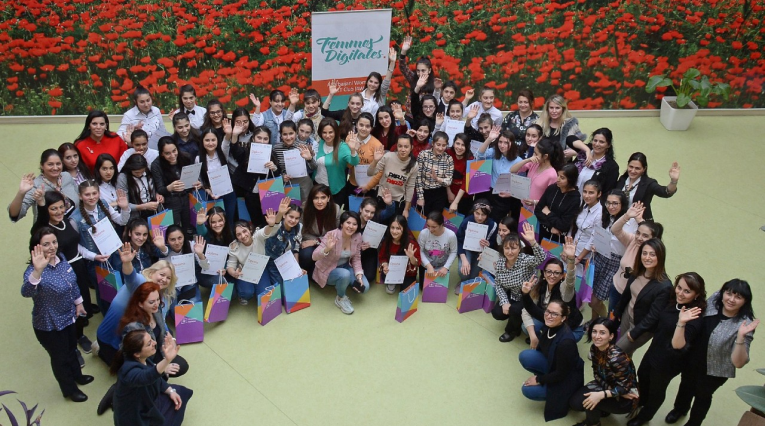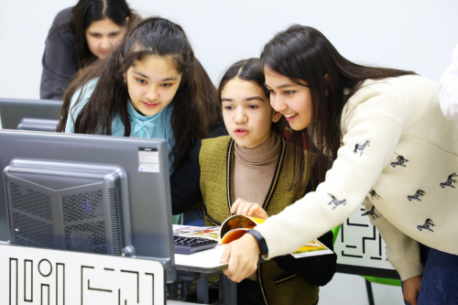Connecting girls to a bright future in ICT
The massive job losses from the COVID-19 pandemic (114 million to date) could be offset by the “jobs of tomorrow.” Millions of new jobs are forecast in the green economy, data science and artificial intelligence, engineering, cloud computing and product development.
But are these jobs for everyone?
The Covid-19 pandemic has widened gender and other inequalities in employment, with women (and industries dominated by women) experiencing the largest job losses. And men currently earn most degrees and hold most jobs in these future-proof areas.
As we mark International Girls in ICT Day, we must zoom in on the multiple barriers that prevent women from entering technology fields in large numbers, many starting in girlhood. Girls often lack access to digital skills and technology, cultural and gender norms inhibit them from learning these skills, and gender biases in the workplace hamper their entry and rise in tech professions.
In the Europe and Central Asia region, the share of women in working in the ICT sector ranges from 23 percent of workers in Turkey to 44 percent in Armenia. While some countries may have relatively higher proportions of women in ICT, they also encounter glass ceilings. In Belarus, for example, women are paid 44 percent less than men for working the same job. In Armenia, Azerbaijan, Belarus, Georgia, Moldova and Ukraine collectively, women make up only 20 percent of tech leaders and 16 percent of tech founders.
Fortunately, change is happening. Across our region, non-profit organizations and the private sector have pioneered community-driven approaches to work locally to encourage girls and young women to pursue studies, careers and entrepreneurship in ICT. Such programmes are bridging the gender divides in tech with visible results. Policymakers, academics and businesses have much to learn from these initiatives while designing COVID-19 recovery responses to ensure girls and boys alike are included in the economies of tomorrow. UNDP's new regional advocacy platform STEM4ALL is supporting these actors to share knowledge, skills and connections.

A training of Femmes Digitales
Dismantling barriers, harnessing passions
In Azerbaijan, women account for 30 percent of workers in the ICT sector. Femmes Digitales, founded in 2014 by tech executives, brings trainings to girls aged 14-17 living in rural areas, where outdated school curricula and entrenched stereotypes deny them access to such opportunities. Run by volunteers, more than 100 such events have reached over 5,000 girls. According to co-founder Jana Krimpe, programmes not only empower girls with technical skills, but also show them and their parents the importance of acquiring such skills and combating gender stereotypes. UNDP in Azerbaijan recently launched a programme connecting young women with industry mentors in science, technology, engineering and mathematics (STEM) for support and encouragement through their school and career journeys. They draw upon Femmes Digitales’ network to recruit gender equality champions and professionals to amplify their reach and impact.
A growing body of research suggests that hands-on activities that spur girls to combine creativity and addressing social challenges help stimulate interest in tech. Technovation, an international nonprofit, pursues a bottom-up approach by empowering local leaders, organizations, volunteers and girls to identify problems in their community that can be solved with technology. In Uzbekistan, where only 18 percent of graduates in ICT are women, UNDP and Technovation challenge young people to tackle local issues with technology such as developing mobile applications that teach children about nature preservation and everyone about garbage sorting and recycling. Since 2016, more than 1,200 girls have participated.

Photo: Engineering Girls of Turkey
In Turkey, women are only 26 percent of university students enrolled in ICT-related programmes, and women hold only 23 percent of ICT jobs. Limak, a private sector holding, created Engineer Girls of Turkey with the support of UNDP in Turkey, the Ministry of Family, Labour and Social Services, and the Ministry of National Education. In five years, 430 young women have benefited from scholarships, mentoring, online training programmes, internships and employment opportunities at Limak’s companies. The programme shows how private sector engagement in tech education can help to build more gender-balanced pipelines for the workforce.
A call to policymakers, educators and businesses
With such successes, these ground-up initiatives are forging pathways for women and girls in ICT. Policymakers can support them by introducing government reforms to foster gender-mainstreamed and future-ready skills.
First, national ICT policies can expand broadband access to facilitate equal opportunities for skill learning, especially in rural areas. In Estonia, the Government prioritized closing the country’s “digital divide” with collaboration among the private sector, academia and citizens. The percentage of Estonians connected to the internet tripled to 90 percent in two decades.
Second, schools can help to spark interest in careers not traditionally considered for women. In particular, requiring classes in ICT subjects can build confidence in girls who otherwise might not consider it a viable career option due to family or cultural biases. For example, Bulgaria and the UAE require all students to take ICT classes at pre-tertiary levels, and Romania requires it of all students who wish to study any science discipline.
As in the case of Technovation in Uzbekistan, there is some evidence (for example, in Finland and the USA) that school curricula connecting hard skills (like programming) with big-picture topics showing technology's impact on society make these subjects more appealing to girls.
Third, similar to initiatives led by Limak and Microsoft, governments can also partner with the private sector at the local level to offer young women scholarships, internships and apprenticeships to expand their opportunities in the ICT sector.
And finally, companies and higher education institutions can partner with local and national governments and non-profits to support re-skilling efforts for women who wish to switch careers or reenter the workforce. They can also revise recruitment, retention and promotion policies to promote gender equality, offer diversity and inclusion trainings for management and staff, and introduce equitable paid family leave and other future-ready workplace measures.
These are just a few of the many strategies that can grow the share of girls and women in the ICT sector. In the spirit of today’s theme “Connected Girls, Creating Brighter Futures”, let us celebrate and sustain the work of locally rooted and needs-driven community-based initiatives for girls in ICT. We can bring the entire STEM ecosystem together to help women realize their full potential and build stronger and sustainable economies.

